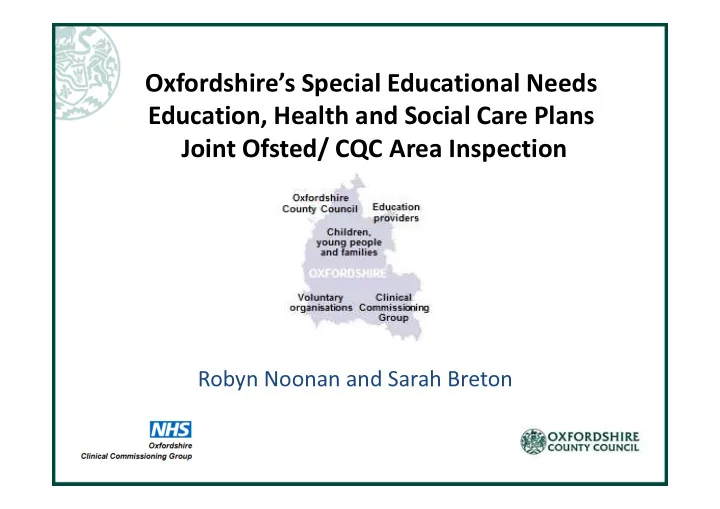

Oxfordshire’s Special Educational Needs Education, Health and Social Care Plans Joint Ofsted/ CQC Area Inspection Robyn Noonan and Sarah Breton
SEND Education, Health and Care Plans (EHCP) Joint Area Inspection 2017 Week one : • Desk top review of evidence including self- evaluation and action plans Sept 18 - 22 • Planning for week 2 • 10 visits to education providers (early years to post 16) Week two: • 26 meetings (OCC, CCG and multi-agency) Sept 25 – 29 • Over 100 cases selected , approximately 25% examined. 22 November 2018 2
Setting the Scene for young people In Oxfordshire there are 3,700 children and young people with an EHCP Of those 629 are aged 18-25 years In addition there are 12,000 young people aged 0-25 years who have special educational needs without an EHCP The health, education and social care statutory responsibilities are defined by the Children and Family Act 2014 and the Care Act 2014 22 November 2018 3
What is our duty? Key principles in both Children and Families Act 2014 and the Care Act 2014 are: a. Supported decision making b. A focus on wellbeing and outcomes c. Personalised assessment and planning d. Co-operation and integration e. Information, advice and support 22 November 2018 4
Duties? • Joint commissioning must include arrangements for: - securing EHC needs assessments - securing the education, health and care provision specified in EHC plans, and - agreeing Personal Budgets 22 November 2018 5
Duties? The Care Act 2014 requires local authorities to • ensure co-operation between children’s and adults’ services so that young adults are not left without care and support as they make the transition from children’s to adult social care. There is a duty to carry out a transition • assessment when a young person is “likely to have needs” post-18 22 November 2018 6
Oxfordshire’s EHCP key strengths Multi-agency working in the early years SEN Support guidance coproduced with parents Post 16 education, employment and training and routes into employment (supported internships) Services supporting children with hearing impairment, visual impairment and Downs Syndrome and Autism Integrated therapy service 0-18 22 November 2018 7
Key EHCP strengths continued EHC plans consistently capture the voice of the child and young person and their family. Quality of special schools and resource bases Short breaks for children and young people Supported living for adults and high numbers in settled accommodation The SEND information and advice service (SENDIASS) 22 November 2018 8
Five areas of significant weakness in Oxfordshire The lack of clearly understood and effective lines of accountability for the implementation of the reforms The quality and rigour of self-evaluation and monitoring and the limited effect it has had on driving and securing improvement The quality of EHC plans The timeliness of the completion of EHC plans The high level of fixed-term exclusion of pupils in mainstream secondary schools who have special educational needs and social, emotional and mental health needs in particular. 22 November 2018 9
Improvements underway now New SEND Programme Board chaired by a Cabinet Member. Funding approved to increase capacity in adult social care and the SEND teams to respond to the statutory timescales and quality of plans. E-learning module on EHCPs rolled out across the workforce and additional outcomes training delivered. 22 November 2018 10
And also…. New guidance available for adult social care in what ‘good’ looks like for EHCPs Designated Clinical Officer appointed working with 0 - 25 years. New process for ensuring high quality health and social care assessments available within 6 weeks Focus on school exclusions – and young people on part time timetables. 22 November 2018 11
No room for complacency We anticipate a reinspection of our ‘Written Statement of Action’ early 2019 Quality of The timeliness of individual plans assessments within remains a statutory challenge but is the timescales is the most important biggest challenge factor for many for our current parents processes The lack of a single How will we know IT system continues when we’ve got to cause problems there???? 22 November 2018 12
What next….. Commission 0-25?.... What might this look like? E ducation Health Social Care • Preparation for • Clinical Health • EHCP 0-25 years adulthood 14-22 services 0-25 years • Prevention of • All age intensive • Advocacy service 0- placements a long support team 25 years way from home • Short breaks 0-25 • CHC consistency years • End of life • Mental Health • Positive Behaviour support A single multi-agency response to a young person and their family 0-25 years A single education, health and social care decision from 0-25 years A single Education, Health and Care Plan 22 November 2018 13
Next steps? 22 November 2018 14
Recommend
More recommend